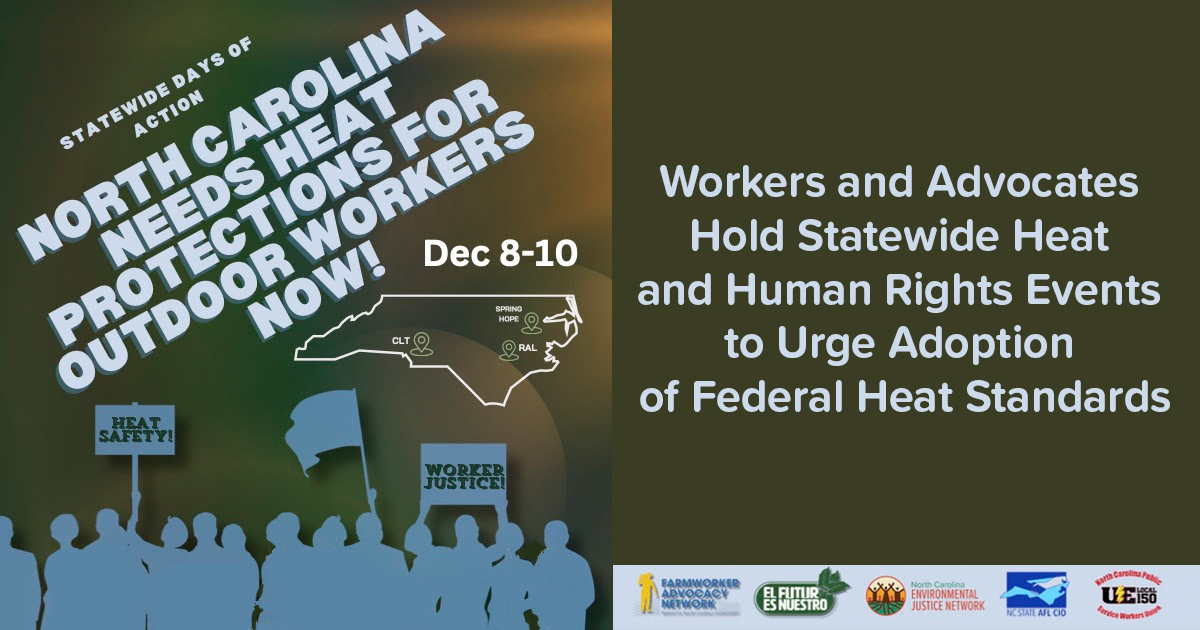Updated: News coverage of the events can be found here from NC Newsline and here from NC Health News.
SPRING HOPE, NC (December 8, 2024) 7840 Old Bailey Hwy, Spring Hope, NC 27882, 12PM
Contact: Leticia Zavala, El Futuro Es Nuestro
RALEIGH, NC (December 9, 2024) 1 E Edenton St, Raleigh, NC 27601, 4PM
Contact: Kendall Wimberley, Toxic Free NC
CHARLOTTE, NC (December 10, 2024) 206 E Tremont Ave, Charlotte, NC 28207, 4:30PM
Contact: Kass Ottley, UE150
As the international community prepares to recognize Human Rights Day in the coming week, a coalition of North Carolina organizations are leveraging the December 10th commemoration to call for basic protections for workers exposed to extreme temperatures on the job. The group is hosting three regional Heat and Human Rights Events on December 8th, 9th, and 10th.
“Heat safety affects us all – from the person growing our food, working in a warehouse, responding to our emergencies and maintaining our nation’s aging infrastructure. It is imperative that we as a society protect these workers and pass common sense legislation to ensure that they are protected from the effects of heat related illnesses.” Joel Bryan, Raleigh City Workers Union, UE Local 150 steward in the Utilities department.
Farmworkers Abel and Pedro in Wilson and Nash counties operating under the H-2A visa program reflected on the dangerous working conditions, “There are many complications with our body where we can lose our life, we must have breaks in high temperatures and be able to drink clean water and our employers must be responsible for our health and safety on the job. … It is hard working in the fields, some of us are scared to speak up because of the abuses and the threats on the growers, but if we do not speak up we will never change things. Every time we speak up we are participating in a battle that will take us closer to peace and justice!”
“No one should die because their employer failed to do what is necessary to save their life from known and preventable hazards, including extreme heat. And it is the duty of the Department of Labor to see to it that never happens.” said NC State AFL-CIO President MaryBe McMillan.
In July 2023, 33 year-old Juan José Ceballos died after suffering a heat stroke in Wayne County where he was working as a migrant farmworker. Months later, on September 5th, José Arturo Gonzalez Mendoza died while working in the heat, at the time of his death he was 30 years old. And in the summer of 2024, 51 year-old U.S. postal worker, Wednesday “Wendy” Johnson died in Fayetteville. She died after spending several hours in a hot mail truck.
Workers and advocates are urging the finalization of the Occupational Safety and Health Administration (OSHA) proposed standards for Heat Illness and Injury Prevention. The standards will require several interventions by employers to protect workers from heat including developing and implementing a work site heat injury and illness prevention plan (HIIPP) with site-specific information to evaluate and control heat hazards in their workplace, identifying heat hazards in both outdoor and indoor work sites, and implementing control measures at or above the Initial Heat Trigger (a heat index of 80°F). The new standards will apply to all employers conducting outdoor and indoor work in all general industry, construction, maritime, and agriculture sectors where OSHA has jurisdiction. The public is encouraged to comment on the standard through the ‘Heat Injury and Illness Prevention in Outdoor and Indoor Work Settings’ form on the Regulations.gov website. The deadline to submit comments is Jan. 14, 2025.
The rule can’t come a moment too soon. Recent years have been record-setting, however, scientists predict temperatures will only get hotter. A January 2024 publication from NOAA, the National Oceanic and Atmospheric Administration, reported that 2023 was the warmest year since global records began in 1850. Recent data from the North Carolina Department of Health and Human Services (NC DHHS) reported a total of 14 deaths due to heat in the state from June 2023 to September 2024. NC DHHS also reported an average of approximately 4,000 emergency department visits for heat related incidents from May 1 through September 30, a period considered ‘heat season’. Though these incidents occur broadly, people who work outdoors are at substantially greater risk. In North Carolina there are no explicit employee safety laws related to temperature and heat.
According to the North Carolina Department of Labor (NC DOL), employers operate under the General Duty Clause which states “Each employer shall furnish to each of his employee’s conditions of employment and a place of employment free from recognized hazards that are causing or are likely to cause death or serious injury or serious physical harm to his employees.” Labor and health advocates maintain that this clause is insufficient to protect workers. Our groups ask to meet with Farley in January to discuss plans to protect workers from heat.
The following organizations work in coalition to support environment, agriculture, and labor rights in North Carolina. The Heat and Human Rights event series are hosted by: Toxic Free NC (TFNC), El Futuro Es Nuestro (It’s Our Future), The Farmworker Advocacy Network (FAN), Hispanic Federation (HF), NC Public Service Workers Union (UE Local 150) North Carolina Environmental Justice Network (NCEJN), North Carolina Justice Center and The American Federation of Labor and Congress of Industrial Organizations (AFL-CIO)























